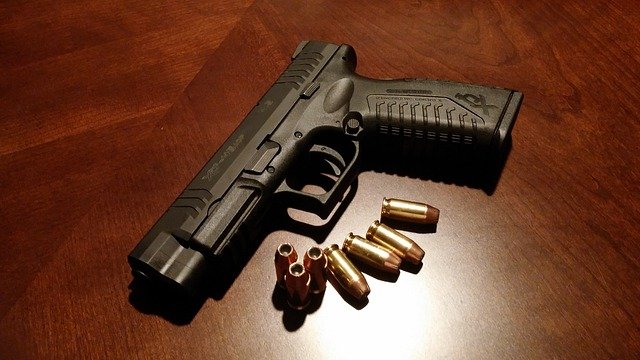How California got tough on guns
The modern American gun debate began in 1967, when 30 protesting members of the Black Panther Party marched into the California Capitol with loaded handguns, shotguns and rifles. In California there were few restrictions on carrying loaded weapons in public.
That soon changed. The Panthers’ efforts to “police the police” already had led Republican Assemblyman Don Mulford to propose legislation to ban the “open carry” of loaded firearms within California cities and towns. After the Panthers showed up in the Capitol, his bill sailed through and was signed by then-Gov. Ronald Reagan. It’s hard to say which now seems more unlikely: that two dozen revolutionaries could legally stroll into the state Assembly chamber with semi-automatic rifles, or that a Republican governor would champion stricter gun control.
In the years since, California’s progressive politicians have layered on restrictions while gun owners and manufacturers continue to try to find their way out of them. And every new mass shooting — most recently the one on April 3 that killed six people just blocks from the state Capitol — reignites the debate.
On June 4, 2021 — National Gun Violence Awareness Day — a federal judge deemed California’s ban on assault weapons a “failed experiment” and unconstitutional, although he stayed his own ruling to give the state time to appeal, which it did. And on June 21, 2021, a three-judge panel of the U.S. 9th Circuit Court of Appeals blocked the judge’s decision while other gun cases are pending. The case could end up before the U.S. Supreme Court.
A 2016 ballot measure championed by Gov. Gavin Newsom required background checks to purchase ammunition, but that and another provision of the measure, banning high-capacity magazines were both declared unconstitutional by a federal district court judge. On Nov. 30, 2021, the ruling on magazines was reversed by a federal appeals court. It was a win for the state, but potentially a short-lived one. Gun rights activists plan to ask the U.S. Supreme Court to weigh in. But it’s also possible that the ruling could lead to one upholding the ban on assault weapons.
The battle continues.
This year Newsom has responded to a U.S. Supreme Court decision allowing a strict Texas abortion law to stay in place by threatening a similar California law on assault weapons and “ghost” guns. Democrats including the governor, Attorney General Rob Bonta and key legislators are now pushing legislation that would allow private lawsuits against gun makers and sellers, just as the Texas law permits them against abortion providers.
Newsom denounces “a gun lobby willing to sacrifice the lives of our children to line their pockets.” A National Rifle Association spokesman predicts the Trump-altered Supreme Court means “winter may very well be coming for gun laws in California.”
How strict are California’s gun laws compared to other states?
California has a reputation for being tough on guns. That reputation is well-earned.
Researchers at Boston University have counted 111 California laws that in some way restrict “the manner and space in which firearms can be used.” They include regulations on dealers and buyers, background check requirements, and possession bans directed at certain “high risk” individuals.
By their count, no other state out-regulates California when it comes to sheer quantity of rules. And we’ve held that top spot since at least 1991, the year the researchers started counting.
The Giffords Law Center To Prevent Gun Violence, a gun control advocacy group, awarded California one of only two “A” grades in its 2020 state gun law scorecard.
“There are not a lot of As out there,” said Ari Freilich, the organization’s California legislative affairs director. “California has driven the conversation nationally.”
In contrast, Guns and Ammo magazine labeled California the 5th worst state for gun owners. (Washington D.C. was the top jurisdiction, followed by New York.)
New rules on the way? Gun bills in 2022
Gov. Gavin Newsom opened the legislative session this year with a call to action inspired by Texas Republicans and the conservative majority on the nation’s highest court.
Last year, Texas enacted a first-of-its-kind anti-abortion law that gave private citizens the right to sue clinics, patients or anyone else who “aids and abets” someone in ending a pregancy, empowering them to collect as much as $10,000 in damages plus legal fees. After the U.S. Supreme Court allowed the law to stand (for now), Newsom responded with a modest proposal of his own. In February, the governor rolled out a package of new gun bills, including one that would, Texas-style, give private citizens the right to sue firearm makers and sellers who violate certain state gun laws and to collect a bounty for their trouble.
The idea was cheered on by most Democrats in the Legislature. But predictably, the cause took on a new urgency after fresh tragedies struck. In late February, a man killed his three daughters and their legal chaperone in a Sacramento church before killing himself. On April 4, the violence came even closer to the halls of power when six people were killed in a mass shooting just blocks from the Capitol.
The governor’s gun bill package:
- Senate Bill 1327: Allows private citizens to sue anyone who manufactures, transports or sells banned “assault weapons,” “ghost guns” or restricted firearm components in California. Like its anti-abortion counterpart in Texas, those who bring the suit can seek as much as $10,000 in damages. The bill has an automatic self-termination clause that would be triggered if and when the Texas law is struck down.
- Assembly Bill 1594: Allow gun violence victims and the state attorney general to sue gun manufacturers and distributors who failed to establish “reasonable controls to protect public health and safety.” That would punch a hole in a federal law from 2005 that shields gun makers from responsibility when their products are used to commit crimes.
- AB 1621: Current law already requires anyone who purchases an “unfinished receiver” to receive a background check, but this bill would treat these proto-gun components as legal firearms under state law. It would also ban the sale of firearms that do not have a state-provided serial number.
- AB 2571: Place new restrictions and fines on companies that advertise firearms or ammunition to minors, be it by print, television, on the internet or in video games.
Other notable gun bills:
- SB 906: Require school districts to survey parents about whether they have firearms in the home and how they are stored. School officials would also be required to report any “perceived threat” of a mass shooting event to law enforcement.
- SB 915: Ban the sale of firearms on state property. This would apply to county fairgrounds, effectively banning gun shows at those venues.
- AB 2156: Requires anyone who produces more than four firearms per year, either by milling together unfinished components or with the use of a 3D printer, to first get a gun manufacturing license from the state.
- AB 2239: California law bans people who have been convicted for felonies and certain misdemeanors from owning a firearm for 10 years. This would add child and elder abuse to that list.
– By Ben Christopher/CalMatters – Ben covers California politics and elections. Prior to that, he was a contributing writer for CalMatters reporting on the state’s economy and budget.





















